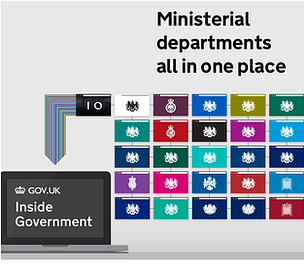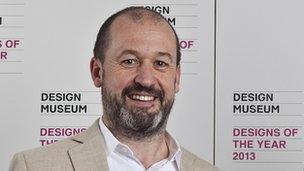Inside the UK Government Digital Service
- Published

The gov.uk mobile website
Over the past few months, BBC Radio 4's Jon Manel has been given exclusive access to the civil servants in one of the newest parts of the British government.
If Sir Humphrey stepped into the large open plan office on the sixth floor of the building almost opposite Holborn tube station in London, he would probably keel over.
It is the civil service minister, but not as we know it.
There is an inflatable guitar - a red one. You cannot fail to miss the bunting. And then there are the mascots.
"For us, the Platform Team, it's an otter. His name is Jerry," one woman explains pointing to a brown and white soft toy with a rather sad expression on its face.
The man in charge here is Mike Bracken. Bearded and open shirted, he is the executive director of all things digital for the UK government. When I point out the decorations, not to mention the men wearing shorts, he says "that's all acceptable".
It is not only the lack of grey suits that might cause a raised eyebrow or two among traditionalists. The average age here is rather younger than you would probably find anywhere else in government.
Take Jordan Hatch for example. "I'm 19," he tells me. "I joined GDS at 17 and before that I was at college."
He is wearing a t-shirt, jeans, brightly coloured socks and deck shoes.
GDS stands for Government Digital Service but you would be forgiven for thinking the "G" is for geek.
"I would describe myself as a geek," he adds. "I like computers a lot. I like trying to build new things, interesting things."
For 24 year old Nick Stenning, it is about reclaiming the word. "Most people here would self-define as geeks." The term, he says, denotes "expertise or skill in a technical field".
The geeks have designed a new single website for all government departments - www.gov.uk, external - and Mike Bracken says its creation was much needed.
"We had thousands of websites. And the only thing that was consistent was there was not a single consistent thing across any of them. It's quite a feat of human ingenuity to spend so much money on coming up with something that never looks the same."
Saving money
Saving money is one of GDS's key roles. It is, after all, part of the Efficiency and Reform Group in the Cabinet Office.
The lift arrives on floor six and Mike Bracken is rushing into it. He is late for an important appointment.

Mike Bracken leads a young team that is purposely located outside Whitehall
"Today's a meeting with some of the bigger companies that we've been dealing with for a long period of time about how we need to work smarter and quicker and cheaper," he says.
One of his tasks is to try to end the days of the fabled multi-billion pound government IT contracts, which seemed to last forever.
"I think it's what a Parliamentary committee described as an oligopolistic supply chain," he explains during the journey down to the ground floor.
The word oligopoly has been used by two Parliamentary committees over the last few years and in the government's official ICT (Information and Communications Technology) Strategy. It means a market dominated by a small number of sellers.
"We certainly do want to work with anyone but only work with them in certain ways," he says. "What we are trying to do is do things in a quicker, more agile way, much more cost effective - fail fast if we have to."
The reputation of government IT projects is not good and it is going to be a difficult one to shake off.
The government recently revealed that, last September, its own internal review gave the Universal Credit project an "amber/red rating", meaning its successful delivery was "in doubt" and urgent action needed to be taken.
The flagship initiative is designed to eventually bring together six benefits into one payment.
Universal credit
Mike Bracken says he is "not that close" to the scheme, which is being introduced by the Department for Work and Pensions.
He tells me: "I started in this job in May 2011, which is well after Universal Credit started so we have followed off the back of many existing projects of which Universal Credit is one."
"And, also, many of the very large contracts that we have in government have been in place for a long number of years."
GDS has a "few people who are trying to help out in Universal Credit" but he says that is no different to those who are assisting other government schemes.
"Our role at the centre is to provide the complementary and specialist skills… that maybe they've lacked in the past."
The government says it is on course to begin what it calls the national roll-out of Universal Credit in October.
Meanwhile, Mike Bracken jokes that he spends 110% of his time trying to convince government departments to change the way they do things and have done things for years. Clearly, that task has led to some interesting conversations, including those he has had with HM Revenue and Customs. Its chief executive and permanent secretary is Lin Homer.
'Stormy arguments'
"The forming and storming part of our relationship was pretty stormy," she tells me.
"We are really passionate about changing… but we think we know our business and, indeed, we do know our business.
"We argued about everything. We argued about time, we argued about money, we argued about approach. And I think towards the end of those debates we got to places that actually we both found pretty exciting."
She admits: "I think I'd say they are bumptious on occasion, but I like bumptious."
As for the young civil servants in the GDS headquarters, some of them seem to have an almost evangelical spirit about them.
Standing in the centre of the open plan office, Nick Stenning says: "Geeks get frustrated when things are wrong or when they don't work very well.
"And it's probably safe to say that government IT services and government websites aren't or haven't been historically the shining example of how to do things properly.
"The opportunity to come in and help government do them properly is quite attractive".
Jon Manel's reports about the Government Digital Service were broadcast on the World at One on Monday and Tuesday. Listen to the full reports on the BBC's IPlayer.
- Published17 April 2013
- Published25 June 2010